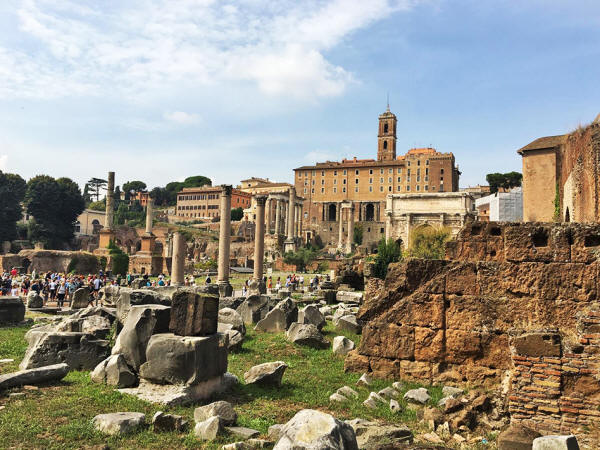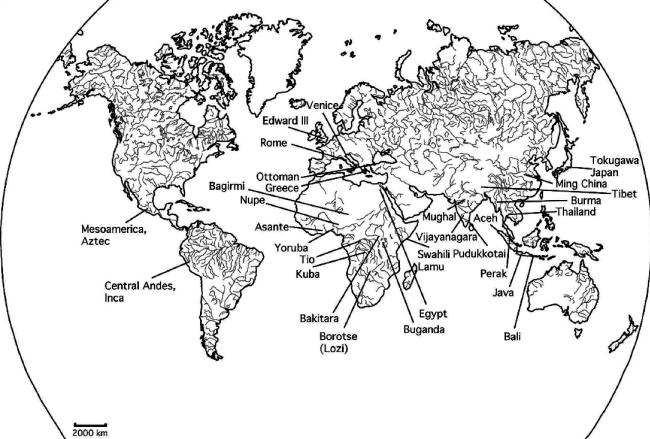|

by
Kate Golembiewski
October 16,
2020
from
EurekAlert Website
Spanish
version
Italian
version

The ruins of the Roman Forum,
once a
site of a representational government.
Credit: (c) Linda Nicholas, Field Museum
The
world has never seen a Technocracy, but all previous
civilizations and governmental systems have come and
gone.
Accordingly, the United States and its Constitutional
Republic of government is in its sunset phase unless its
citizenry can resuscitate it.
Source
History shows
that societies
collapse
when leaders
undermine social contracts...
All good things must come to an end.
Whether societies are
ruled by ruthless dictators or more well-meaning representatives,
they fall apart in time, with different degrees of severity.
In a new paper (Moral
Collapse and State Failure - A View from the Past - here
too), anthropologists examined a
broad, global sample of 30 pre-modern societies.
They found that when
"good" governments - ones that provided goods and services for their
people and did not starkly concentrate wealth and power - fell
apart, they broke down more intensely than collapsing despotic
regimes.
And the researchers found
a common thread in the collapse of good governments:
leaders who
undermined and broke from upholding core societal principles,
morals, and ideals.
"Pre-modern
states were not that different from modern ones.
Some pre-modern
states had good governance and weren't that different from
what we see in some democratic countries today," says Gary
Feinman, the MacArthur curator of anthropology at Chicago's
Field Museum and one of the authors of a new study in
Frontiers in Political Science.
"The states that
had good governance, although they may have been able to
sustain themselves slightly longer than autocratic-run ones,
tended to collapse more thoroughly, more severely."
"We noted the potential for failure caused by an internal
factor that might have been manageable if properly
anticipated," says Richard Blanton, a professor emeritus of
anthropology at Purdue University and the study's lead
author.
"We refer to an
inexplicable failure of the principal leadership to uphold
values and norms that had long guided the actions of
previous leaders, followed by a subsequent loss of citizen
confidence in the leadership and government and collapse."
In their study (PDF),
Richard Blanton, Gary Feinman, and their colleagues
took an in-depth look at the governments of four societies:
-
the Roman Empire
-
China's Ming
Dynasty
-
India's Mughal
Empire
-
the Venetian
Republic

Source
These societies
flourished hundreds (or in ancient Rome's case, thousands) of years
ago, and they had comparatively more equitable distributions of
power and wealth than many of the other cases examined, although
they looked different from what we consider "good governments" today
as they did not have 'popular elections'...
"There were basically
no electoral democracies before modern times, so if you want to
compare good governance in the present with good governance in
the past, you can't really measure it by the role of elections,
so important in contemporary 'democracies'...
You have to come up
with some other yardsticks, and the core features of the good
governance concept serve as a suitable measure of that," says
Feinman.
"They didn't have
elections, but they had other checks and balances on the
concentration of personal power and wealth by a few individuals.
They all had means to
enhance social well-being, provision goods and services beyond
just a narrow few, and means for commoners to express their
voices."
In societies that meet
the academic definition of "good governance," the government meets
the needs of the people, in large part because the government
depends on those people for the taxes and resources
that keep the state afloat.
"These systems
depended heavily on the local population for a good chunk of
their resources.
Even if you don't
have elections, the government has to be at least somewhat
responsive to the local population, because that's what funds
the government," explains Feinman.
"There are often
checks on both the power and the economic selfishness of
leaders, so they can't hoard all the wealth."
Societies with good
governance tend to last a bit longer than autocratic governments
that keep power concentrated to one person or small group.
But the flip side of that
coin is that when a "good" government collapses, things tend to be
harder for the citizens, because they'd come to rely on the
infrastructure of that government in their day-to-day life.
"With good
governance, you have infrastructures for communication and
bureaucracies to collect taxes, sustain services, and distribute
public goods. You have an economy that jointly sustains the
people and funds the government," says Feinman.
"And so social
networks and institutions become highly connected, economically,
socially, and politically.
Whereas if an
autocratic regime collapses, you might see a different leader or
you might see a different capital, but it doesn't permeate all
the way down into people's lives, as such rulers generally
monopolize resources and fund their regimes in ways less
dependent on local production or broad-based taxation."
The researchers also
examined a common factor in the collapse of societies with good
governance:
leaders who abandoned
the society's founding principles and ignored their roles as
moral guides for their people.
"In a good
governance society, a moral leader is one who upholds the
core principles and ethos and creeds and values of the
overall society," says Feinman.
"Most societies
have some kind of social contract, whether that's written
out or not, and if you have a leader who breaks those
principles, then people lose trust, diminish their
willingness to pay taxes, move away, or take other steps
that undercut the fiscal health of the polity."
This pattern of amoral
leaders destabilizing their societies goes way back:
the paper uses
the Roman Empire as an example...
The Roman emperor
Commodus inherited a state with
economic and military instability, and he didn't rise to the
occasion; instead, he was more interested in performing as a
gladiator and identifying himself with Hercules.
He was eventually
assassinated, and the empire descended into a period of crisis and
corruption.
These patterns can be
seen today, as
corrupt or inept leaders threaten
the core principles and, hence, the stability of the places they
govern:
...are all evidenced in
democratic nations today.
"What I see around me
feels like what I've observed in studying the deep histories of
other world regions, and now I'm living it in my own life," says
Feinman.
"It's sort of like
Groundhog Day for archaeologists and historians."
"Our findings provide insights that should be of value in the
present, most notably that societies, even ones that are well
governed, prosperous, and highly regarded by most citizens, are
fragile human constructs that can fail," says Blanton.
"In the cases we
address, calamity could very likely have been avoided, yet,
citizens and state-builders too willingly assumed that their
leadership will feel an obligation to do as expected for the
benefit of society.
Given the failure to
anticipate, the kinds of institutional guardrails required to
minimize the consequences of moral failure were inadequate."
But, notes Feinman,
learning about what led to societies collapsing in the past can help
us make better choices now:
"History has a chance
to tell us something.
That doesn't mean
it's going to repeat exactly, but it tends to rhyme. And so that
means there are lessons in these situations."
| 


